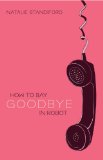Summary | Excerpt | Reviews | Beyond the Book | Readalikes | Genres & Themes | Author Bio

If other people had been around, I would have been mortified. Actually, no one else was around, and I was still mortified.
“Mom, please,” I said. “We knew him for two or three hours, tops.”
“Poor Peaches!” she sobbed. “Poor little Peaches.”
I once had a cat named Iggy, who died when I was twelve. The night after he died, a huge water bug skittered across the kitchen floor of our old house in Austin. The bug’s zigzaggy gallop looked like Iggy’s, and my grief-numbed body flushed with hope and gratitude. He was back! For a split second I was sure that bug was Iggy reincarnated, come back to live with me again. I didn’t care that he was a water bug, as long as I could have my Iggy, whatever form he took. Then Dad squashed him — the water bug, I mean — and that hope turned acid and dissolved. I felt I’d lost Iggy yet again.
But I was wrong. The water bug wasn’t Iggy. Iggy wasn’t coming back, not in any form. I repeated those words to myself over and over until I stopped seeing him in every fly, every moth, every mouse, and accepted it. I learned my lesson. By now, Mom should have learned this lesson too. No amount of wishing will bring back the dead.
“His name wasn’t Peaches,” I said. “He was probably old. How long do gerbils live, anyway? A few weeks? A year?”
“Oh!” Mom cried. “You’re heartless.” She put the gerbil’s body back in the fishbowl and stared at me hard. “You’re not a girl,” she told me. “You’re a robot!”
The sobs returned then, the kind that shake your whole body. She melted onto the kitchen floor in a puddle of tears and lilac cologne.
Maybe I am a robot, I thought. Am I? I knocked on my belly. It didn’t clang, the way a robot’s belly should. Far from it. But that assumed a robot was always made of tin, or steel, or some other clangy metal. By now, it seemed to me, scientists should have invented a robot material that felt and sounded more like human flesh. Or at least that wouldn’t clang.
Meanwhile, there was Mom, still crouched in her pool of lilac-scented tears. What is she so upset about? I wondered. It couldn’t be the gerbil. She’d been crying a lot even before we found him. It had to be the Move. But we’d already moved a thousand times — it felt like a thousand times, anyway — and it had never seemed to bother her before. I was the one who hated moving, until I finally got used to it. I learned not to get too attached to anything. I stopped thinking of the houses we lived in as my house, or the street we lived on as our street. Or my friends as my friends. Not that I had so many.
We moved for Dad. Most professors stay at one university, but Dad was always looking for more grant money or smarter students or more kowtowing from his colleagues. So we moved from Iowa City to Madison to Austin to Ithaca. . . . Up next, Baltimore. Johns Hopkins, the holy grail of pre-med students and biology professors like Dad.
I’d have to start my senior year of high school in a new city at a small private school where all the other kids had known each other since they were three. And you didn’t see me crying. So what was Mom’s problem? Ithaca was freezing in the winter, and the town was pocked with deep gorges that Cornell students threw themselves into when they got depressed, and no one blamed them. Baltimore had to be better than that. At least it couldn’t be worse.
“I don’t understand,” I said. “Why are you so upset?”
She sat up, sniffed, and wiped her eyes. “I don’t know. The poor little thing! I can’t leave him behind. . . .”
“You mean it is the gerbil?” I said. “You’re really upset about the gerbil?”
Excerpted from How To Say Goodbye In Robot by Natalie Standiford. Copyright © 2009 by Natalie Standiford. Excerpted by permission of Scholastic. All rights reserved. No part of this excerpt may be reproduced or reprinted without permission in writing from the publisher.
Too often we enjoy the comfort of opinion without the discomfort of thought.
Click Here to find out who said this, as well as discovering other famous literary quotes!
Your guide toexceptional books
BookBrowse seeks out and recommends the best in contemporary fiction and nonfiction—books that not only engage and entertain but also deepen our understanding of ourselves and the world around us.